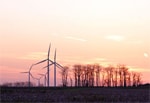 |
|
Blowout: EDP Renováveis’ stock tumbled more than 20% after its IPO |
In the first seven months of the year, 167 listings raised a total of just $20.3 billion in EMEA compared to $76.4 billion from 397 deals in the same period of 2007. A telltale sign of the market’s volatility was that 52 EMEA IPOs—worth $9.4 billion—were withdrawn or postponed. That was more than double last year’s total.
Some key sectors have bucked the trend. Energy, both renewable and traditional, has been a focus for many investors in 2008 and produced the two largest deals of the year to date. Czech coal mining company New World Resources, which plans to expand into neighboring Poland, triumphed with a £1.1 billion ($2.1 billion)London, Prague and Warsaw listing that priced at the top of its marketing range at the beginning of May. Its shares gained 7.6% on their debut in May and were up 33.7% after a month of trading.
In contrast, shares of the second-largest IPO of the year, Portuguese green-energy giant EDP Renováveis’ €1.84 billion ($2.71 billion) IPO at the end of May, have performed poorly. The stock fell 4.4% on its first day, was down 11.9% a month after its debut and by mid-August was more than 20% below its issue price.
The other main theme of EMEA IPOs so far this year is the increased importance of emerging markets, neatly highlighted by New World Resources scoring the largest float of 2008. Both the third- and fifth-largest IPOs of the year, Turk Telekom and Kenyan cellphone operator Safaricom (which is partly owned by the UK giant Vodafone), were straightforward plays on the growth potential of emerging markets.
What is worrying bankers is that both energy and emerging markets stocks now appear to be falling out of favor with investors. Oil has slumped from its high of $147 a barrel in mid-July, and emerging markets are weaker because of lower global economic growth and falling commodities prices. If investors shy away from even these sectors, it’s hard to see where IPOs in the remainder of 2008 will come from.



